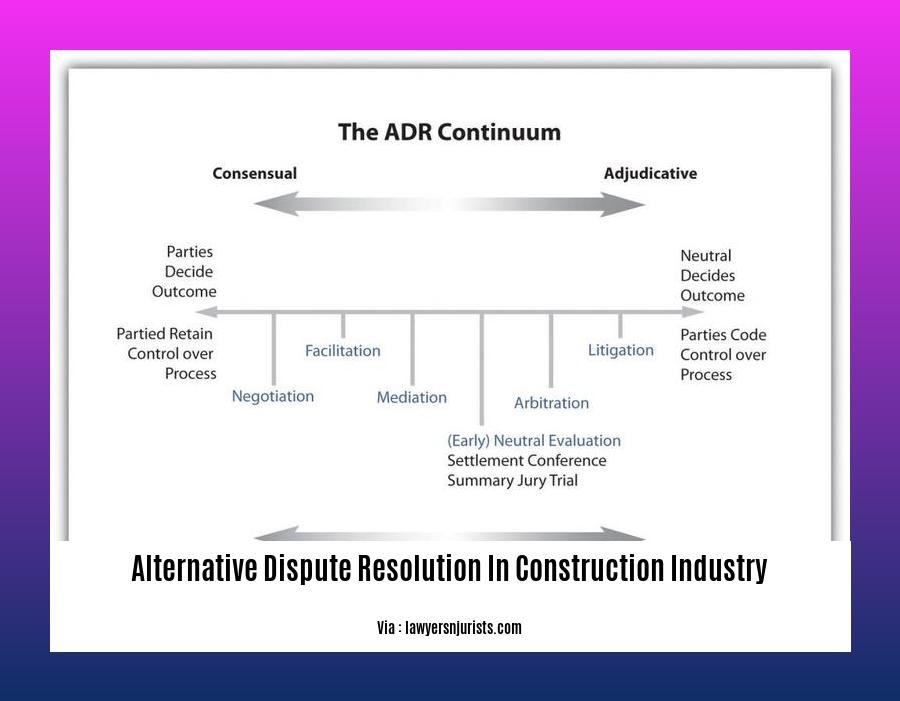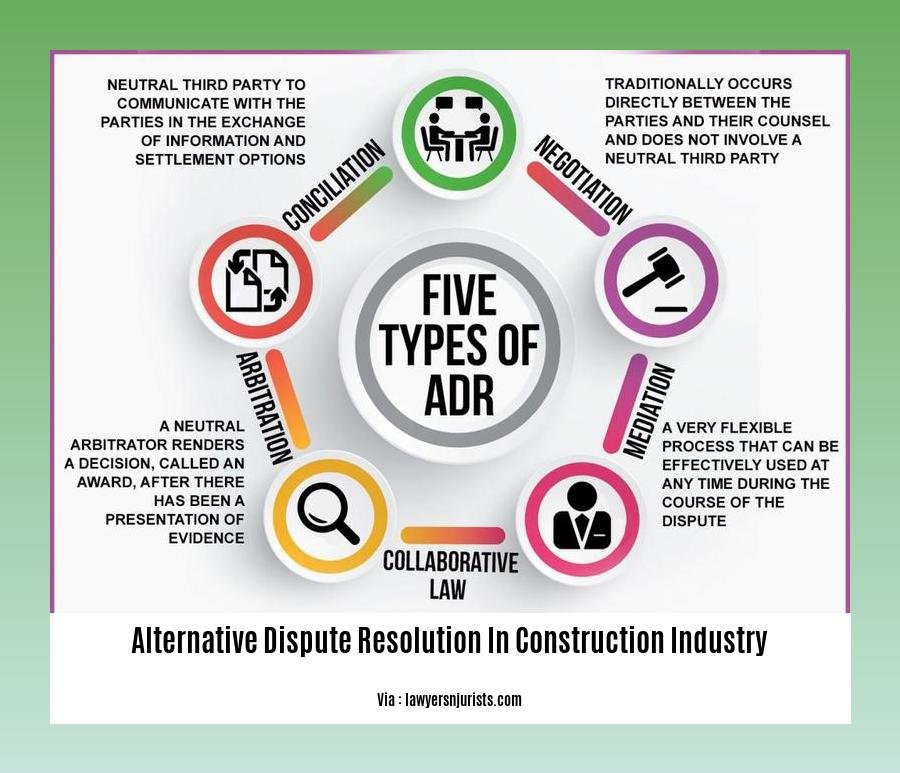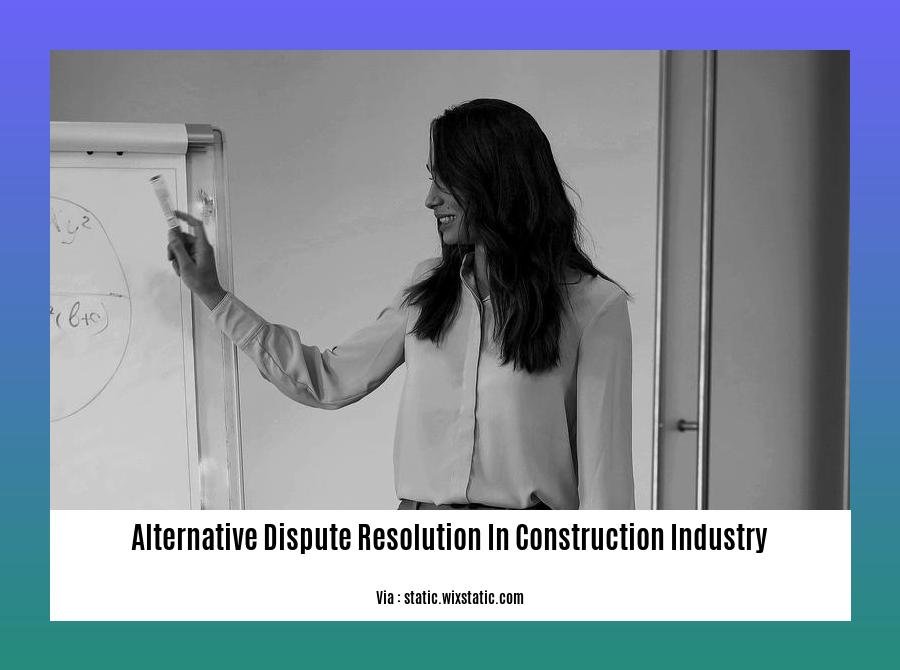Alternative Dispute Resolution (ADR) plays a significant role in resolving construction industry disputes, offering faster and more cost-effective alternatives to traditional arbitration and litigation. This comprehensive guide, “Alternative Dispute Resolution in Construction Industry: A Comprehensive Guide”, will explore the benefits, best practices, and specific ADR techniques applicable to construction disputes in Canada.
Key雹:
- Definition of Alternative Dispute Resolution (ADR) in construction
- Most common ADR methods in construction:
- Mediation
- Arbitration
- Adjudication
- Benefits of ADR:
- Quicker and more cost-effective than court proceedings
- Involves a neutral third party
Alternative Dispute Resolution in Construction Industry: Navigating Disputes Effectively


In the construction industry, disputes are inevitable. Alternative dispute resolution (ADR) offers a way to resolve these disputes without resorting to costly and time-consuming court proceedings.
ADR encompasses various methods designed to facilitate agreement and preserve relationships. Here’s an overview of some common ADR mechanisms:
Mediation
- A neutral third party (mediator) facilitates a discussion between disputing parties.
- The mediator guides the conversation, encourages communication, and helps explore possible solutions.
Arbitration
- A neutral third party (arbitrator) hears evidence from both sides and issues a binding decision.
- Arbitration is typically more formal than mediation and may involve legal representation.
Adjudication
- A statutory process available in some jurisdictions.
- An adjudicator makes binding decisions on specific issues, often involving payment disputes.
Benefits of ADR in Construction
- Faster: ADR processes are generally quicker than court proceedings, minimizing disruption to projects.
- Less Costly: ADR typically involves lower fees than litigation.
- Preserves Relationships: ADR fosters open communication and encourages parties to maintain a working relationship.
- Expertise: ADR professionals have specialized knowledge in construction disputes.
When to Consider ADR
- When the dispute is complex or involves multiple parties.
- When there is a desire to preserve the relationship.
- When speed and cost are important factors.
By leveraging ADR, construction professionals can effectively resolve disputes, minimize disruption, and ensure the successful completion of projects.
When managing construction sites, apply workplace safety and health protocols to ensure a safe working environment. For financial institutions, partnering with asset reconstruction companies can aid in managing non-performing assets. If you are specifically looking for such services within India, explore the offerings of asset reconstruction companies in India or asset reconstruction company in India.
Alternative Dispute Resolution in Construction Industry Template
ADR is becoming increasingly popular in the construction industry as a way to resolve disputes quickly and cost-effectively. There are various types of Alternative Dispute Resolution In Construction Industry Template methods, each with its own advantages and disadvantages.
Types of ADR
The most common types of ADR in the construction industry include:
- Negotiation: This is the most informal type of ADR and involves the parties to the dispute trying to reach an agreement on their own.
- Mediation: This involves a neutral third party helping the parties to reach an agreement.
- Arbitration: This is a more formal type of ADR, where an arbitrator makes a binding decision on the dispute.
- Dispute review boards (DRBs): These are panels which are established at the beginning of a construction project to help resolve disputes that arise during the course of the project.
Benefits of ADR
There are many benefits to using ADR to resolve construction disputes, including:
- Speed: ADR is often much faster than traditional litigation.
- Cost-effectiveness: ADR is typically less expensive than litigation.
- Preservation of relationships: ADR can help to preserve relationships between the parties to the dispute.
- Flexibility: ADR can be tailored to the specific needs of the parties to the dispute.
When to Use ADR
ADR is not appropriate for all construction disputes. It is most effective in disputes where the parties are willing to work together to reach a resolution. ADR is also not appropriate in disputes where there are complex legal issues involved.
How to Choose an ADR Method
There are a number of factors to consider when choosing an ADR method, including:
- The nature of the dispute
- The parties involved in the dispute
- The time and cost constraints involved
Key Takeaways:
- ADR is a valuable tool for resolving construction disputes.
- There are various types of ADR, each with its own advantages and disadvantages.
- ADR is often faster, less expensive, and more flexible than traditional litigation.
- ADR can help to preserve relationships between the parties to the dispute.
Citations:
- Alternative Dispute Resolution (ADR) in the Construction Industry
- The Benefits of ADR in the Construction Industry
In-house
Title:** Quizzes A Problem Solving a Problem!
-
[Method 1] Identify the nature of the dispute and the parties involved. This will help you determine which ADR method is most appropriate.
-
[Method 2] Research different ADR providers and their fees. This will help you find a provider that is qualified and affordable.
-
[Method 3] Prepare for the ADR process by gathering relevant documents and information. This will help you present your case effectively.
-
[Method 4] Participate in the ADR process in a cooperative and respectful manner. This will help you reach a resolution that is fair and equitable.
-
[Method 5] Follow up after the ADR process to ensure that the resolution is implemented and that the parties are satisfied with the outcome.
- How to Get Rid of Mushrooms in Your Lawn: A Complete Guide - April 24, 2025
- How to Get Rid of Ground Hornets: A Safe and Effective Guide to Eliminating Nests - April 24, 2025
- How to Get Rid of German Roaches Fast: DIY Methods for Quick Control - April 24, 2025










